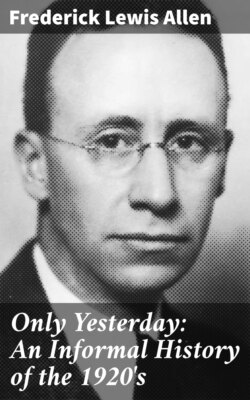Читать книгу Only Yesterday: An Informal History of the 1920's - Frederick Lewis Allen - Страница 12
На сайте Литреса книга снята с продажи.
[7]
ОглавлениеTable of Contents
Woodrow Wilson lived on in Washington--in a large and comfortable house on S Street--for over three years after this final crushing defeat. Those who came to call upon him toward the end found a man prematurely old, huddled in a big chair by the fireplace in a sunny south room. He sat with his hands in his lap, his head a little on one side. His face and body were heavier than they had been in his days of power; his hair, now quite gray, was brushed back over an almost bald head. As he talked he did not move his head--only his eyes followed his visitor, and his right arm swung back and forth and occasionally struck the arm of the chair for emphasis as he made his points. The old-time urbanity was in his manner as he said, "You must excuse my not rising; I'm really quite lame." But as he talked of the foreign policy of the United States and of his enemies, his tone was full of hatred. This was no time to sprinkle rose-water round, he said; it was a time for fighting--there must be a party fight, "not in a partisan spirit, but on party lines." Still he clung to the last shred of hope that his party might follow the gleam. Of the men who had made the fulfillment of his great project impossible he spoke in unsparing terms. "I've got to get well, and then I'm going out to get a few scalps." So he nursed his grievance; an old man, helpless and bitter.
On Armistice Day, five years after the triumphant close of the war, he stood on the steps of his house--supported so that he should not fall--and spoke to a crowd that had gathered to do him honor. "I am not," said he, "one of those that have the least anxiety about the triumph of the principles I have stood for. I have seen fools resist Providence before and I have seen their destruction, as will come upon these again--utter destruction and contempt. That we shall prevail is as sure as that God reigns."
Three months later he was dead.
